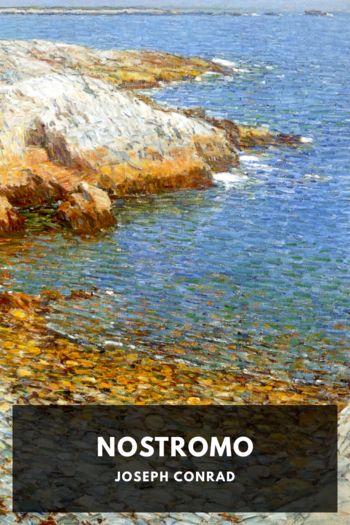Nostromo - Joseph Conrad (books to read fiction .TXT) 📗

- Author: Joseph Conrad
Book online «Nostromo - Joseph Conrad (books to read fiction .TXT) 📗». Author Joseph Conrad
The doctor breathed freely. “Listen, capataz,” he said, stretching out his arm almost affectionately towards Nostromo’s shoulder. “I am going to tell you a very simple thing. You are safe because you are needed. I would not give you away for any conceivable reason, because I want you.”
In the dark Nostromo bit his lip. He had heard enough of that. He knew what that meant. No more of that for him. But he had to look after himself now, he thought. And he thought, too, that it would not be prudent to part in anger from his companion. The doctor, admitted to be a great healer, had, amongst the populace of Sulaco, the reputation of being an evil sort of man. It was based solidly on his personal appearance, which was strange, and on his rough ironic manner—proofs visible, sensible, and incontrovertible of the doctor’s malevolent disposition. And Nostromo was of the people. So he only grunted incredulously.
“You, to speak plainly, are the only man,” the doctor pursued. “It is in your power to save this town and … everybody from the destructive rapacity of men who—”
“No, señor,” said Nostromo, sullenly. “It is not in my power to get the treasure back for you to give up to Sotillo, or Pedrito, or Gamacho. What do I know?”
“Nobody expects the impossible,” was the answer.
“You have said it yourself—nobody,” muttered Nostromo, in a gloomy, threatening tone.
But Dr. Monygham, full of hope, disregarded the enigmatic words and the threatening tone. To their eyes, accustomed to obscurity, the late señor Hirsch, growing more distinct, seemed to have come nearer. And the doctor lowered his voice in exposing his scheme as though afraid of being overheard.
He was taking the indispensable man into his fullest confidence. Its implied flattery and suggestion of great risks came with a familiar sound to the capataz. His mind, floating in irresolution and discontent, recognized it with bitterness. He understood well that the doctor was anxious to save the San Tome mine from annihilation. He would be nothing without it. It was his interest. Just as it had been the interest of señor Decoud, of the Blancos, and of the Europeans to get his cargadores on their side. His thought became arrested upon Decoud. What would happen to him?
Nostromo’s prolonged silence made the doctor uneasy. He pointed out, quite unnecessarily, that though for the present he was safe, he could not live concealed forever. The choice was between accepting the mission to Barrios, with all its dangers and difficulties, and leaving Sulaco by stealth, ingloriously, in poverty.
“None of your friends could reward you and protect you just now, capataz. Not even Don Carlos himself.”
“I would have none of your protection and none of your rewards. I only wish I could trust your courage and your sense. When I return in triumph, as you say, with Barrios, I may find you all destroyed. You have the knife at your throat now.”
It was the doctor’s turn to remain silent in the contemplation of horrible contingencies.
“Well, we would trust your courage and your sense. And you, too, have a knife at your throat.”
“Ah! And whom am I to thank for that? What are your politics and your mines to me—your silver and your constitutions—your Don Carlos this, and Don Jose that—”
“I don’t know,” burst out the exasperated doctor. “There are innocent people in danger whose little finger is worth more than you or I and all the Ribierists together. I don’t know. You should have asked yourself before you allowed Decoud to lead you into all this. It was your place to think like a man; but if you did not think then, try to act like a man now. Did you imagine Decoud cared very much for what would happen to you?”
“No more than you care for what will happen to me,” muttered the other.
“No; I care for what will happen to you as little as I care for what will happen to myself.”
“And all this because you are such a devoted Ribierist?” Nostromo said in an incredulous tone.
“All this because I am such a devoted Ribierist,” repeated Dr. Monygham, grimly.
Again Nostromo, gazing abstractedly at the body of the late señor Hirsch, remained silent, thinking that the doctor was a dangerous person in more than one sense. It was impossible to trust him.
“Do you speak in the name of Don Carlos?” he asked at last.
“Yes. I do,” the doctor said, loudly, without hesitation. “He must come forward now. He must,” he added in a mutter, which Nostromo did not catch.
“What did you say, señor?”
The doctor started. “I say that you must be true to yourself, capataz. It would be worse than folly to fail now.”
“True to myself,” repeated Nostromo. “How do you know that I would not be true to myself if I told you to go to the devil with your propositions?”
“I do not know. Maybe you would,” the doctor said, with a roughness of tone intended to hide the sinking of his heart and the faltering of his voice. “All I know is, that you had better get away from here. Some of Sotillo’s men may turn up here looking for me.”
He slipped off the table, listening intently. The capataz, too, stood up.
“Suppose I went to Cayta, what would you do meantime?” he asked.
“I would go to Sotillo directly you had left—in the way I am thinking of.”
“A very good way—if only that engineer-in-chief consents. Remind him, señor, that I looked after the old rich Englishman who pays for the railway, and that I saved the lives of some





Comments (0)